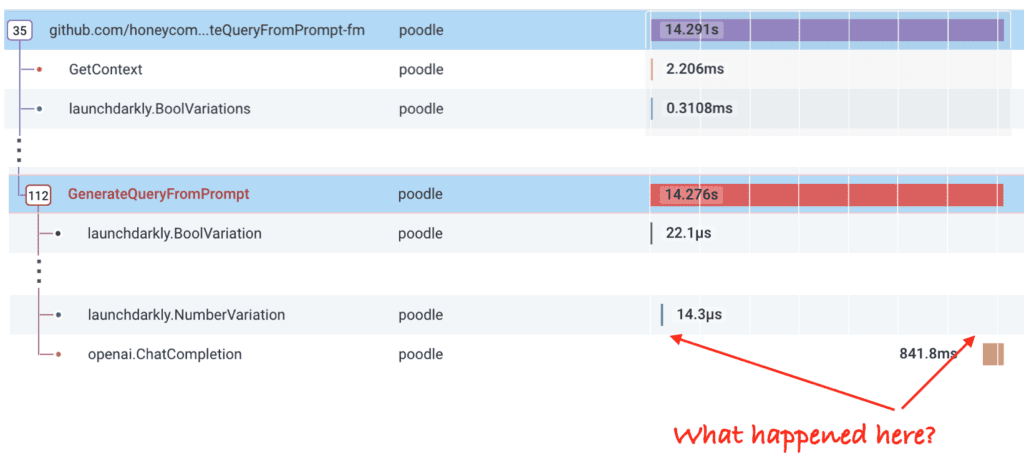Developing with OpenAI and Observability
By Jessica Kerr | Last modified on May 23, 2023Honeycomb recently released our Query Assistant, which uses ChatGPT behind the scenes to build queries based on your natural language question. It's pretty cool.
While developing this feature, our team (including Tanya Romankova and Craig Atkinson) built tracing in from the start, and used it to get the feature working smoothly.
Here's an example. This trace shows a Query Assistant call that took 14 seconds. Is ChatGPT that slow? Our traces can tell us!
The API call to ChatGPT is called "openai.ChatCompletion" and it took 840ms. What happened during the 12+ seconds right before that? We can't tell!

So Craig and Tanya added some instrumentation. They created spans representing important units of work: constructing the prompt, and as part of that, truncating the list of available fields we send as part of the prompt. Now we can see what’s happening!

To truncate the column list, we call a library that counts tokens in the prompt. With traces that show how long it’s taking, Tanya and Craig tried various optimizations until they landed on one that was close enough on the token count—and much, much faster. Here’s the trace from a query I ran today:

This is observability during development: see what you’re doing, make the feature better, and keep that same visibility in production.
Want to learn more? Read the announcement on Query Assistant, and try it yourself by signing up for Honeycomb today.
Related Posts
How We Leveraged the Honeycomb Network Agent for Kubernetes to Remediate Our IMDS Security Finding
Picture this: It’s 2 p.m. and you’re sipping on coffee, happily chugging away at your daily routine work. The security team shoots you a message...
Driving Exceptional Support: Unleashing Support Power with Honeycomb
n technical support, ensuring customer satisfaction and quickly resolving issues are of utmost importance. At Honeycomb, we embrace a comprehensive approach by using our own...
How Our Love of Dogfooding Led to a Full-Scale Kubernetes Migration
When considering a migration to Kubernetes, as with any major tech upgrade or change, it’s imperative to understand the motivation for doing so. The engineering...

